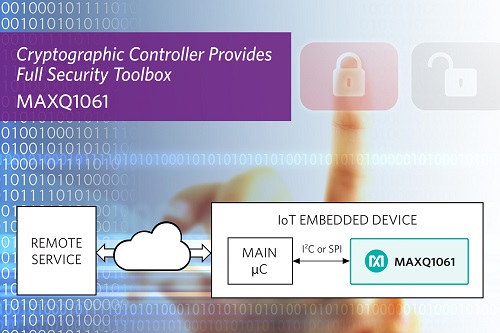
The MAXQ1061 DeepCover device meets three key requirements that customers have for embedded devices security. For authenticated and encrypted communications, the MAXQ1061 supports the TLS protocol. For key protection, it enables secure key and certificate storage. And by supporting secure boot, the MAXQ1061 protects embedded devices against the insertion of malware.

Designed to meet the stringent requirements of FIPS and Common Criteria EAL4+ certifications, the MAXQ1061 helps developers quickly design security into their products to protect the endpoints of a network. It is a turnkey design, needing no additional development, that provides a high level of abstraction for security functions such as encryption, key negotiation, signature generation and verification, and packet encryption. User-programmable EPROM stores keys, digital certificates, and other data, and a flexible file system manages the access rights for those objects. The chip is also capable of generating its own keys using a true random-number generator. Maxim provides life cycle management and a secure key loading protocol to support the chip’s use.
The chip supports a wide variety of encryption protocols, including symmetric key (AES-128/-256), asymmetric key, and secure hash. It also provides a watchdog timer, tamper detection, and secure boot services, with software reset, wakeup, and shutdown functions. It communicates with a host processor over a choice of communication options, including as an I2 C slave controller or an SPI slave controller with dedicated DMA channel. Because its operation is entirely turnkey, it is suitable both for new designs and as a security enhancement add-on to existing designs.
Advertisement
Learn more about Maxim Integrated








